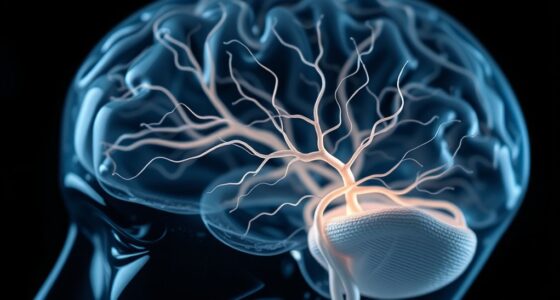Neuroscience shows that your gut feelings come from a complex communication system between your brain and gut, involving nerves, neurotransmitters, and gut bacteria. This “brain-gut axis” influences your mood, stress, and mental clarity. The vagus nerve acts as a highway for these signals, shaping your emotional and physical responses. By understanding how this system works, you can better manage stress and boost resilience—keep exploring to learn more about this fascinating connection.
Key Takeaways
- The gut communicates with the brain via the vagus nerve, influencing mood, stress responses, and emotional resilience.
- Neurotransmitters like serotonin are produced in the gut, directly affecting mental health and emotional regulation.
- The gut-brain axis enables real-time feedback, allowing the brain to rewire and enhance cognitive resilience through neuroplasticity.
- Gut microbiota diversity impacts mental health, with imbalances linked to anxiety, depression, and reduced cognitive flexibility.
- Emotional and hormonal states, such as stress, alter gut function, demonstrating a bi-directional neural pathway influencing “gut feelings.”
The Brain-Gut Axis: Connecting Two Critical Systems
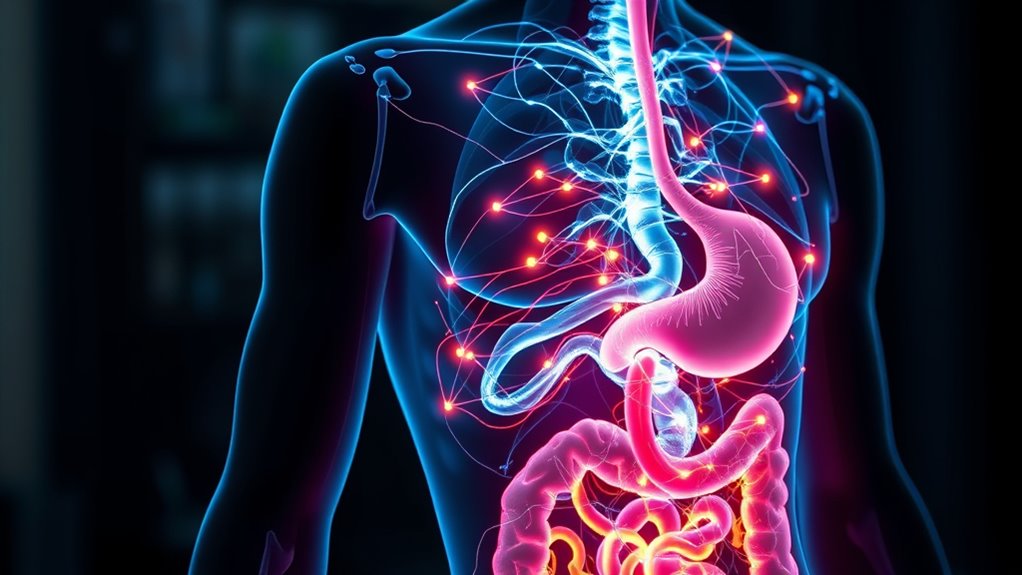
The brain-gut axis is a vital communication network that links your central nervous system with your gastrointestinal system. This connection enables your brain to receive real-time feedback about your gut’s state, influencing mood, stress responses, and overall well-being. Neuroplasticity adaptation plays a key role here, allowing your brain to rewire itself based on gut signals and experiences. This ongoing process helps strengthen cognitive resilience, making you better equipped to handle emotional and physical stressors. When your gut health improves, your brain adapts, fostering better mental clarity and emotional stability. Additionally, maintaining gut health through proper nutrition and lifestyle choices can directly impact your cognitive functions and emotional balance. The use of crochet styles for locs as a form of protective styling exemplifies how external factors can influence internal health and resilience. Recognizing this dynamic connection highlights how your body and mind work together, emphasizing the importance of maintaining gut health for prime cognitive function and resilience.
How Neurotransmitters Bridge the Gut and Brain
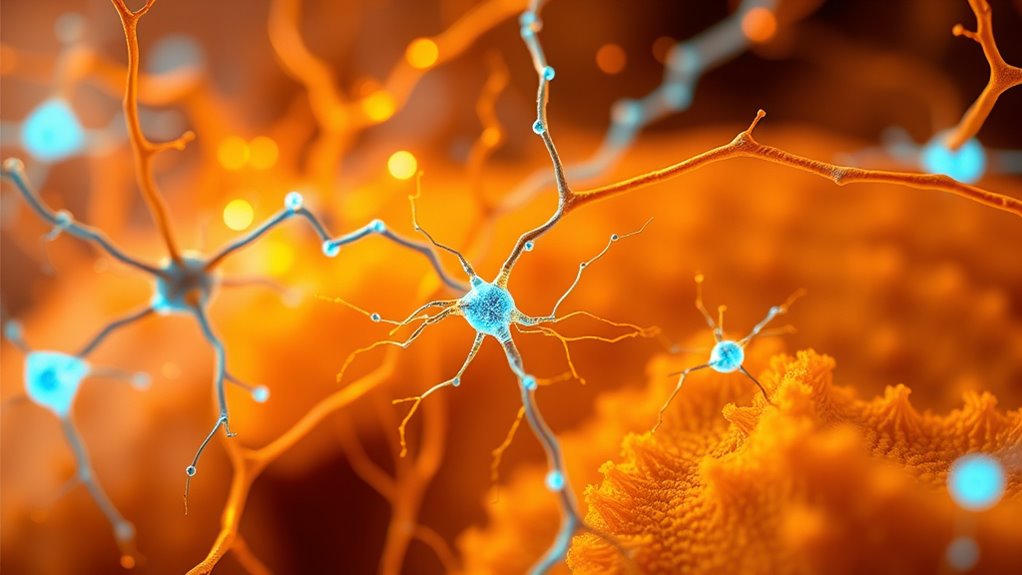
Neurotransmitters serve as the chemical messengers that facilitate communication between your gut and brain, forming a crucial link in the gut-brain axis. Through neurotransmitter signaling, these chemicals enable your nervous system to transmit information rapidly and precisely. During synaptic transmission, neurotransmitters released from nerve cells bind to receptors, allowing signals to jump between neurons or to target tissues. In the gut, cells produce neurotransmitters like serotonin, which influence mood and digestion. These signals travel via the bloodstream and neural pathways, ensuring your brain stays informed about your gut’s state. Proper neurotransmitter regulation is essential for maintaining optimal communication and overall health. Here’s a quick overview:
| Neurotransmitter | Function in Gut-Brain Communication |
|---|---|
| Serotonin | Mood regulation, digestion |
| GABA | Anxiety regulation, gut motility |
| Dopamine | Reward, motivation, gastrointestinal function |
| Acetylcholine | Muscle activation, secretions |
| Norepinephrine | Stress response, alertness |
This intricate signaling keeps your gut and brain in constant dialogue, highlighting the importance of neurotransmitter balance for overall health.
The Role of the Vagus Nerve in Gut-Brain Communication
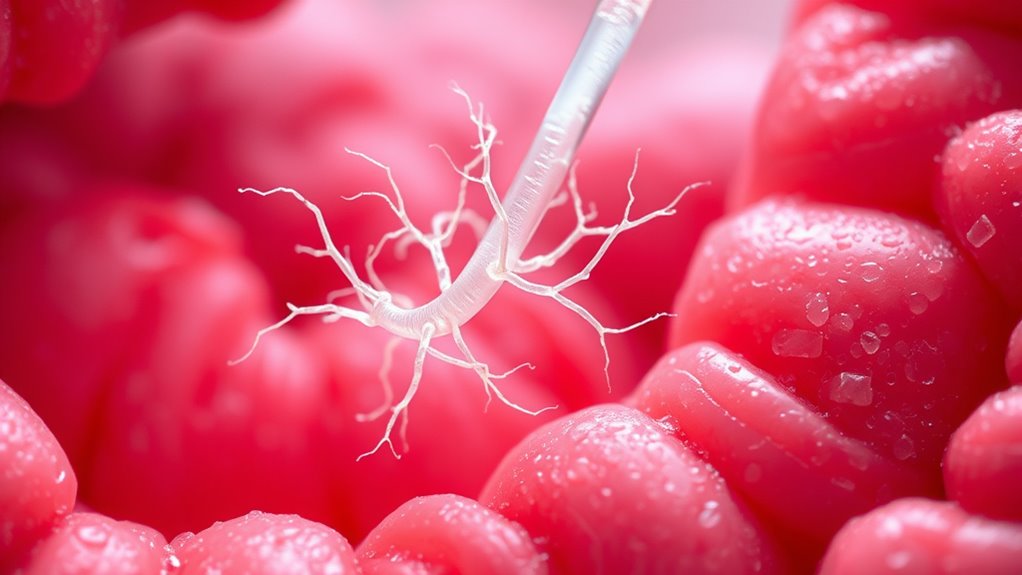
You can think of the vagus nerve as a essential highway connecting your gut and brain. It transmits signals that influence your mood and helps regulate your stress responses. Understanding this pathway reveals how your gut feelings impact your mental well-being. Additionally, tableware plays a role in cultural expressions and social interactions that can influence emotional states. Recognizing how environmental factors impact our physical and mental health further emphasizes the importance of holistic approaches to well-being.
Vagus Nerve Pathways
Because the vagus nerve acts as a critical communication highway between your gut and brain, it plays a central role in how your digestive system influences your mental state. It contains neural pathways that transmit signals from your gut to your brain, involving complex reflex arcs that quickly relay information about digestion and gut health. These reflex arcs allow your body to respond automatically to changes in gut conditions, such as the presence of nutrients or inflammation. The vagus nerve’s pathways are bidirectional, meaning your brain can also send signals back to regulate digestion and gut function. This intricate network ensures your gut and brain stay connected, enabling real-time communication that influences your mood, stress levels, and overall mental well-being. Additionally, research supports the importance of 16PF traits in understanding how personality may impact gut-brain interactions and overall health. Furthermore, studies suggest that enhancing vagal tone through practices like mindfulness exercises can positively influence this communication pathway and improve mental health outcomes.
Mood Regulation Mechanisms
The vagus nerve doesn’t just relay information about digestion; it also plays a key role in shaping your mood and emotional state. It acts as a communication highway between your gut and brain, influencing emotional resilience and neural plasticity. When this nerve functions as effectively as possible, it helps regulate feelings of stress and anxiety, supporting your mental well-being. Disruptions can impair mood regulation, making it harder to adapt to emotional challenges. By engaging in activities that boost vagal tone, you can enhance your capacity to recover from setbacks and strengthen neural pathways involved in emotional processing. AI Entertainment research suggests that the integration of advanced neural interfaces could further enhance vagal function and emotional health. Additionally, maintaining a balanced lifestyle and practicing relaxation techniques can support vagal tone and overall mental resilience.
Stress Response Control
The vagus nerve plays a crucial role in managing your body’s stress response by acting as a communication link between your gut and brain. It helps regulate your emotional responses and enhances cognitive resilience during stressful situations. When your gut signals distress, the vagus nerve transmits this information, enabling your brain to adjust accordingly. This connection supports emotional regulation, allowing you to stay calmer and think more clearly under pressure. By strengthening vagal tone through practices like deep breathing or mindfulness, you can improve your ability to manage stress effectively. In turn, this promotes better gut-brain communication, fostering resilience and stability in your mental and physical health. Ultimately, a healthy vagus nerve is key to maintaining a balanced stress response and overall well-being. According to the latest security system evaluations, enhancing your vagal tone can be as effective as some high-tech security solutions in safeguarding your mental health. Additionally, research highlights that AI safety measures are essential to address emerging vulnerabilities in AI systems, ensuring they remain trustworthy and secure.
Gut Microbiota and Its Impact on Mental Health

Emerging research reveals that your gut microbiota—the vast community of microorganisms residing in your digestive system—plays a crucial role in shaping mental health. A diverse microbiota enhances resilience against mood disorders, influences neurotransmitter production, and supports brain function. When microbiota diversity is low, you may experience increased anxiety and depression. Probiotic therapies, which introduce beneficial bacteria, show promise in restoring balance and improving mental well-being. These therapies can help modulate inflammation and strengthen the gut-brain connection. Maintaining a diverse microbiota through diet, lifestyle, and possibly probiotic interventions is essential for supporting overall mental health. Incorporating Hyundai Tuning techniques into your vehicle customization can serve as a metaphor for optimizing and balancing complex systems, much like maintaining a healthy gut. Understanding the impact of microbiota diversity on your mental health underscores the importance of maintaining a healthy gut through diet, lifestyle, and possibly probiotic interventions. Your gut health truly influences how you feel emotionally and cognitively.
Emotions and the Gut: Scientific Insights
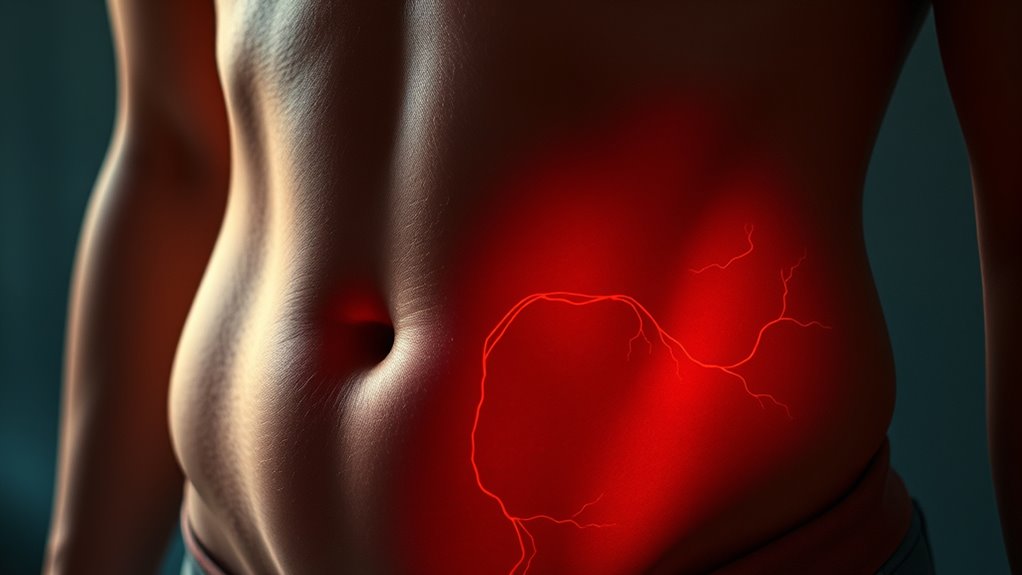
Your emotions can directly influence your digestion through complex gut-brain communication pathways. When you’re stressed or anxious, these signals can alter gut function and discomfort levels. Understanding how emotions impact your gut helps you recognize the powerful connection between your feelings and physical health. Incorporating aromatherapy with essential oils like lavender or chamomile may help soothe your mind and support a healthy digestive system. Additionally, being aware of IRA withdrawal strategies can help manage stress related to financial planning, which may indirectly benefit your emotional well-being and gut health.
Gut-Brain Communication Pathways
Since the gut and brain constantly exchange signals, understanding their communication pathways is essential to grasp how emotions can influence physical health. The primary routes include the vagus nerve, which transmits info directly, and chemical messengers like neurotransmitters and hormones. These pathways enable your gut to affect your brain’s neural plasticity and cognitive flexibility, shaping emotional responses and mental states. Affiliate disclosures also ensure transparency when exploring health-related topics. Additionally, the gut microbiome produces neuroactive compounds that can influence brain function and emotional well-being. The vagus nerve acts as a highway, relaying signals bidirectionally. Gut microbes produce neuroactive compounds influencing brain function. Stress or emotions can alter gut signaling, impacting neural plasticity.
Emotional Influence on Digestion
Emotions have a powerful impact on digestion, actively influencing how your gut functions. When you experience strong feelings like stress or anxiety, your emotional regulation can become overwhelmed, altering gut perception. This heightened emotional state can lead to symptoms such as stomach pain, bloating, or changes in bowel habits. Conversely, positive emotions promote better gut health by supporting relaxation responses that improve digestion. Your brain processes emotions and communicates with your gut through the gut-brain axis, affecting motility and enzyme production. Understanding this connection helps you recognize how emotional regulation directly influences your digestive health. Managing stress and fostering emotional balance can, as a result, improve gut perception and promote a healthier, more comfortable digestive system. Additionally, being aware of Gold IRA scams and how to avoid them can help you protect your financial well-being while focusing on overall health and stability. Recognizing the role of neuroscience in this process can further enhance your ability to manage emotional influences on your digestion.
The Science Behind “Gut Feelings” and Decision-Making

Recent advances in neuroscience reveal that gut feelings are rooted in complex communication between your brain and your digestive system. This connection influences decision-making through a process called the gut-brain axis, where signals from your gut inform your choices. When you practice mindful eating, you tune into these signals, strengthening your gut intuition. Your enteric nervous system, often called the “second brain,” constantly sends data to your brain, shaping your gut feelings and decisions. Understanding this link helps you trust your instincts more. By paying attention to how your body reacts in different situations, you can improve your decision-making skills and experience more aligned choices. This science highlights that your gut isn’t just about digestion—it plays a crucial role in your mental and emotional processes.
Stress, Anxiety, and Their Effects on Gut Function
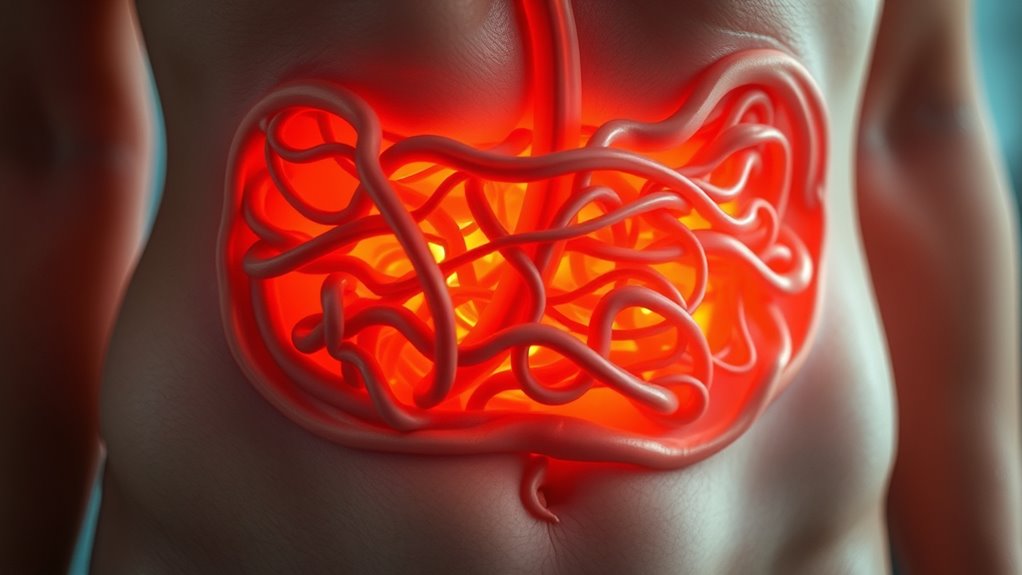
When you’re stressed or anxious, your gut doesn’t stay unaffected. Stress can change how your intestines move, while anxiety can disturb the balance of your gut bacteria. These hormonal shifts directly influence your digestive health, making your gut’s response to emotional states more significant than you might think.
Stress Alters Gut Motility
Stress and anxiety can profoundly disrupt gut motility by triggering the body’s stress response, which directly influences the nervous system controlling the gastrointestinal tract. This response can cause irregular contractions, leading to symptoms like constipation or diarrhea. Chronic stress may also reduce microbiome diversity, weakening your gut’s resilience and making it harder to recover from disturbances. When your stress levels spike, your gut’s rhythmic movements become erratic, impairing digestion and nutrient absorption. To maintain healthy gut motility, managing stress is essential. Building stress resilience through relaxation techniques, regular exercise, and social support can help stabilize your gut function. Prioritizing these strategies supports a balanced microbiome and promotes smoother, more predictable gut movements.
Anxiety Disrupts Microbiome Balance
Chronic anxiety doesn’t just affect your mood; it also disrupts the delicate balance of your gut microbiome. Elevated stress levels can decrease microbiome diversity, leading to less resilient gut health. When anxiety persists, harmful bacteria may proliferate, impairing digestion and immune function. Managing anxiety effectively supports microbiome stability and overall gut health.
| Stress Level | Microbiome Diversity | Gut Function |
|---|---|---|
| High | Decreased | Impaired |
| Moderate | Maintained | Balanced |
| Low | Essential | Healthy |
Focusing on anxiety management techniques helps preserve microbiome diversity, which is crucial for digestion, mood regulation, and immune defense. Recognizing the link between anxiety and gut health encourages proactive steps to maintain balance and prevent dysbiosis.
Hormones Impact Digestive Health
Hormones released during stress and anxiety directly influence your digestive health by altering gut function and microbial balance. When you’re anxious, hormonal fluctuations like increased cortisol can disrupt the production of digestive enzymes, slowing or speeding up digestion. These changes can cause symptoms like bloating, discomfort, or irregular bowel movements. Elevated stress hormones also affect gut motility, leading to either diarrhea or constipation. Additionally, hormonal shifts can weaken the gut’s barrier, making it more susceptible to inflammation and infection. To better understand, consider how stress impacts your body’s ability to produce digestive enzymes or how hormonal fluctuations interfere with nutrient absorption. Being aware of these effects helps you manage stress better for ideal gut health.
The Influence of Diet on Brain-Gut Interactions
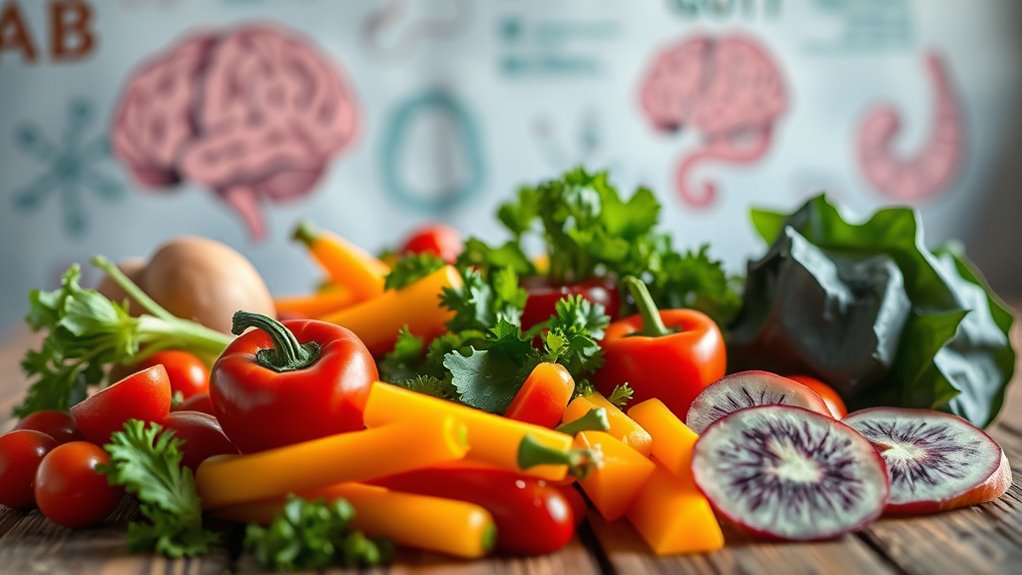
Diet plays a essential role in shaping the complex communication between your gut and brain. Consuming foods rich in dietary antioxidants helps reduce inflammation, supporting healthier brain-gut signaling. Adequate fiber intake promotes a diverse microbiome, which influences mood and cognitive functions. When you choose nutrient-dense options, you strengthen this connection, enhancing mental clarity and emotional balance. Here’s how different foods impact you:
| Food Type | Effect on Brain-Gut Health |
|---|---|
| Rich in antioxidants | Reduces inflammation, improves mood |
| High fiber foods | Supports microbiome diversity, reduces stress |
| Processed foods | Disrupts gut bacteria, triggers anxiety |
| Sugary snacks | Causes inflammation, hampers clarity |
Neuroscience Research on Gut-Related Disorders
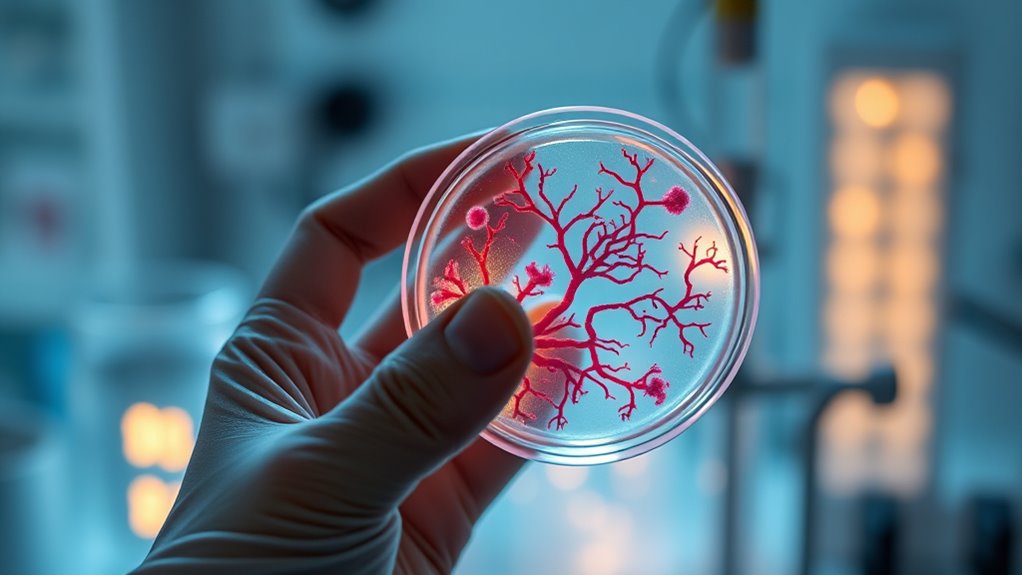
Advances in neuroscience have begun to uncover how disruptions in gut health contribute to a range of neurological and psychiatric disorders. These studies show that gut-related issues can impair your psychological resilience and reduce cognitive flexibility, making it harder to adapt to stress or change. Researchers are focusing on how gut inflammation and microbiome imbalances affect brain function, often leading to anxiety, depression, or cognitive deficits. Understanding these links helps in identifying new treatment strategies. You might find that improving gut health enhances your mental well-being and sharpens your ability to cope with challenges. Here are key insights:
Disruptions in gut health can impair mental resilience and cognitive flexibility, affecting overall brain function.
- Gut-brain axis disruptions influence mental health outcomes
- Microbiome imbalances impact cognitive flexibility
- Restoring gut health can boost psychological resilience
Future Directions in Understanding the Brain-Gut Connection
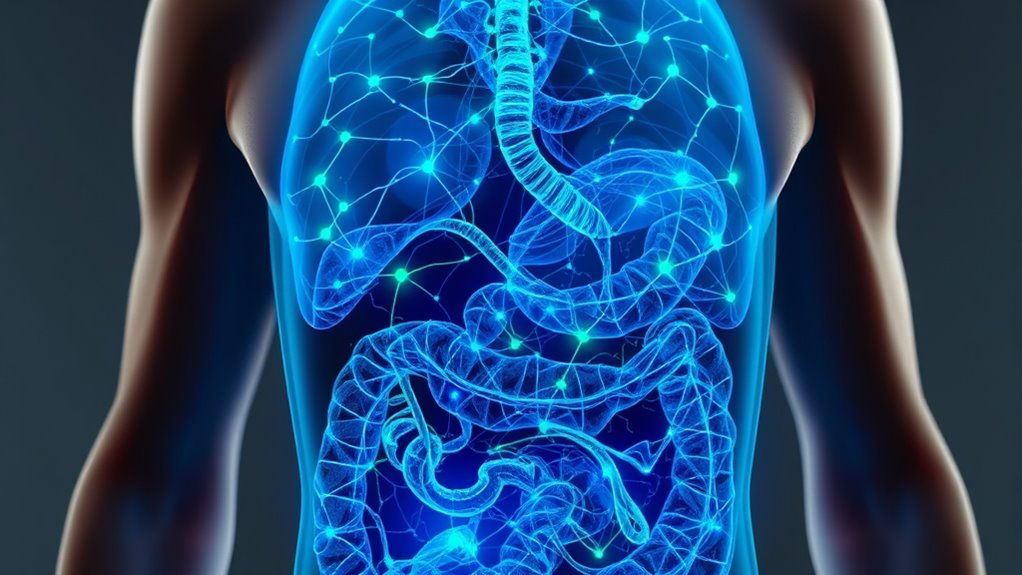
As research continues to evolve, scientists are increasingly focusing on integrating multidisciplinary approaches to deepen our understanding of the brain-gut connection. Neuroplasticity research offers promising insights into how the brain adapts to gut-related signals, revealing potential pathways for modifying gut-brain interactions. Cognitive mapping techniques help identify specific neural circuits involved in processing gut feelings, enabling targeted interventions. Future studies aim to explore how these neural pathways change over time and in response to lifestyle or therapeutic interventions. You can expect advances in imaging technologies and data analysis to clarify how gut signals influence mood, behavior, and decision-making. This integrated approach will help develop personalized treatments for gut-related disorders and improve your overall understanding of how your brain and gut communicate.
Frequently Asked Questions
Can Gut Feelings Influence Long-Term Mental Health Conditions?
Gut feelings can profoundly influence your long-term mental health. When you trust your intuition, it helps build emotional resilience, making you better equipped to handle stress and setbacks. However, if negative gut feelings lead to anxiety, they can worsen mental health conditions over time. By practicing anxiety management techniques and listening to your gut wisely, you can foster healthier mental habits and improve your overall well-being.
How Quickly Can the Gut Communicate With the Brain During Stress?
Ever wonder how fast your gut talks to your brain during stress? Neural signaling between your gut and brain happens almost instantly, often within seconds. When stress hits, your gut sends signals through the vagus nerve, activating your stress response quickly. This rapid communication influences your emotions and reactions, showing just how interconnected your gut and brain are. Can you imagine how this impacts your daily stress management?
Are There Specific Foods That Directly Affect Neurotransmitter Production?
You might wonder if certain foods directly impact neurotransmitter production. Some foods contain dietary neurotransmitters or precursors that influence your brain chemistry. For example, foods rich in tryptophan, like turkey or nuts, support serotonin synthesis. When you eat, your gut nutrient absorption helps supply these essential compounds, affecting your mood and stress levels. So, choosing the right foods can positively influence your neurotransmitter balance through gut-brain communication.
What Are the Latest Technological Tools for Studying the Brain-Gut Connection?
You’re curious about how scientists explore the brain-gut link today. Advanced fMRI technology now offers detailed imaging of brain activity, revealing how your gut signals influence your mind. Meanwhile, wearable neurotech makes real-time monitoring accessible, bridging internal signals with external data. These tools work together, like a map and compass, helping researchers untangle the complex dialogue between your gut and brain, revealing new insights into your health and emotions.
How Do Individual Differences Impact Gut-Brain Communication?
You should know that individual differences like personality traits and genetic factors markedly influence gut-brain communication. Your personality can affect how your brain interprets gut signals, impacting your emotional responses and stress levels. Similarly, genetic makeup determines the sensitivity of your gut and neural pathways, making some people more prone to digestive issues or emotional disturbances linked to gut health. Recognizing these differences helps tailor personalized approaches to improve overall well-being.
Conclusion
Understanding the brain-gut connection is like revealing a hidden dialogue between two essential allies. Your gut’s sensations aren’t just feelings—they’re signals from a complex, finely-tuned system working in harmony with your brain. By paying attention to this silent conversation, you can better navigate stress, mood, and health. Embrace this link, and you’ll discover that your gut feelings are not just whispers—they’re the compass guiding your well-being.



